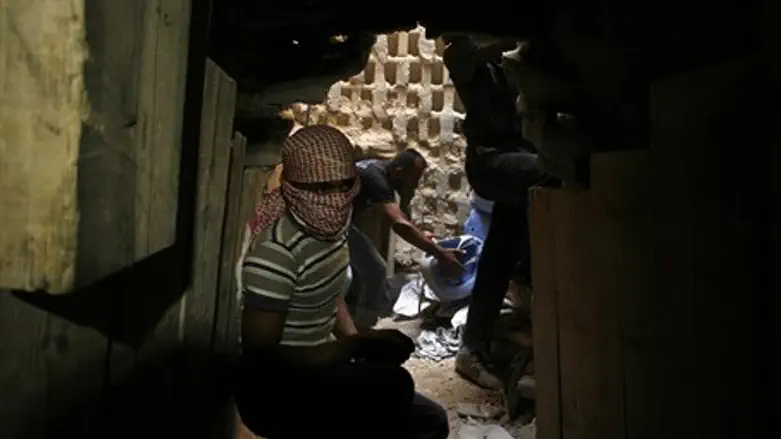
The Egyptian military is continuing its crackdown on the underground smuggling tunnels connecting the Sinai and Gaza, and has launched a new project in this regard, The Associated Press (AP) reported on Monday.
According to the news agency, bulldozers have been digging through the sand along Egypt's border with Gaza in recent days, as part of a project billed as an Egyptian military-operated fish farm.
Military officials told AP the project would effectively fill the border area with water and is designed to put an end to the last remaining cross-border underground smuggling tunnels.
The new excavations seem to be "a tightening of the grip of siege on Gaza," Hamas official Mushir al-Masri said in response, adding that Egypt "should not slide into this cliff that agrees with the Israeli policies of siege."
For several years, Egypt tolerated a smuggling industry, allowing hundreds of tunnels to bring in goods like cigarettes and spare motorbike parts, as well as weapons, into the Hamas-controlled Strip.
These tunnels were a lifeline for Hamas, which collected millions of dollars in taxes and revenues from the smuggled goods. The tunnels continued to thrive after former President Hosni Mubarak was ousted in 2011 and the Islamist Mohammed Morsi won the country's first free presidential election.
Things changed, however, after the Egyptian army ousted Morsi, a key ally of Hamas, in 2013. Since that time, Egypt has been cracking down on the smuggling tunnels as part of an ongoing security campaign in the northern Sinai against terrorists launching attacks on Egyptian police and military personnel.
After a bombing killed more than 30 Egyptian soldiers in the Sinai in October 2014, the military stepped up the campaign to build a buffer zone along the border, as it accused Hamas of supporting the group that carried out the attack, which Hamas has strenuously denied.
The buffer zone was initially planned to be 500 meters wide, but Egypt later decided to expand it by another 500 meters.
As part of the establishment of the buffer zone, Egypt has demolished hundreds of homes and evicted thousands of residents as it destroyed more tunnels. Today,
The violence, however, has continued. Last month, Islamic State-linked (ISIS) jihadists struck Egyptian army outposts in a coordinated wave of suicide bombings and battles, in some of Sinai's deadliest fighting in decades.
Now, Egypt is trying to finish off the tunnels for good, the officials told AP.
Egypt's army began digging last week what officials said will be 18 fisheries along the 9-mile (14-kilometer) border with Gaza, with the purpose of making digging underground tunnels impossible. The military officials spoke on condition of anonymity because they were not authorized to talk to the media.
On Sunday, diggers and bulldozers operated in several locations along the border, according to the news agency. Pairs of 15-inch black steel pipes were scattered in the construction area. Previous plans to dig a small canal were abandoned after studies showed that the water would eventually flood the border completely, the officials said.
The new construction work has had an immediate effect on Gaza's tunnel smuggling trade. One smuggler, who spoke on condition of anonymity because he did not want trouble with the Egyptians, told AP he bought a shipment of motorbike parts for $6,000, but paid $10,000 to get it smuggled into Gaza because the operation has become very risky.
Before the excavation began two weeks ago, 10 packs of cigarettes smuggled through the tunnels from the Sinai Peninsula sold in Gaza for around 110 shekels, or about $28. Now the price has jumped to 125 shekels, or nearly $32.
Hamas-appointed Rafah mayor Subhi Radwan said if the Egyptians filled the wells with sea water, it would damage the aquifer feeding Gaza, a charge Egyptian military officials dismissed. Radwan also said the fisheries would threaten to collapse homes on the Gaza side of the border.
"We appeal to our brothers in Egypt to stop the work that endangers the people of Gaza," Radwan told AP. "Gaza has enough problems: wars, siege and a difficult economic situation."